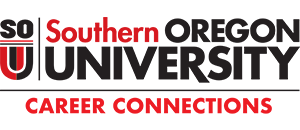
Get Ready for What Comes Next
Now that you know all about yourself and have identified some fields that interest you, you can think about ways to market your value to potential employers. The resources below will help you PREPARE great application materials that will help you articulate all the fantastic skills and experiences that you have accumulated in part-time jobs, internships, classrooms, and co-curricular activities in your application materials.
Resume
A résumé is a snapshot of the education, experience, and skills you have that are valuable to an employer. Its main purpose is to convince a potential employer to invite you for an interview – to make them want to learn more about you. Résumés are used to screen applicants and determine which candidates have the background most closely matching the employers’ needs. It answers the questions: have you, can you, and will you do the job.
Use the resources below to learn more about résumés and get started building your own.
SOU Bullet Point Builder Worksheet
Indeed Job Search Academy resume videos
University of Cincinnati How to Write a CV
Bullet Point Examples to Communicate Part-Time Job Skills (UNC)
Basic Résumé Kit with Template
Artist Résumé Conventions (College Art Association)
Considering Using a Functional or Skills-Based Résumé Format
Cover Letter
You will usually need a cover letter to go with your résumé. The cover letter is a marketing tool – often one of the first things that a recruiter sees about you. Its purpose is to advertise you well enough to secure an interview. It should represent you – your passion, energy, accomplishments, individuality and professionalism within the context of the job to which you are applying. A good cover letter should not, however, simply restate the content of your résumé. Instead, it’s a chance for you to augment that content with some discussion of your work ethic, specific approaches you might take with the job you want, and to illustrate your writing (and thinking) skills.
SOU Cover Letter Guide and Samples
Virginia Tech Cover Letter Types and Samples
Networking
Networking is the process of connecting with others in order to develop professional contacts. It can be a great way to learn more about an industry you are interested in, different routes to a career path, a specific employer, a location, graduate school, and more.
A good place to start is usually people with whom you already share something in common, like SOU alumni, faculty, and staff. Platforms like LinkedIn can allow you to connect to those people, search SOU alumni, and send messages to people whose journey, job, or employer you’d like to know more about. The alumni Raider Network is specific to the SOU community and lets you connect with SOU alumni who want to be more engaged with current SOU students and recent graduates as they start out on their career journeys.
When messaging someone, keep in mind the following guidelines:
- Be polite and courteous.
- Start the message by indicating how you are connected: “I saw that you majored in Communications at SOU, and that’s what I’m studying at SOU as well.”
- Be clear in your ask about why you would like to connect: “Would you be open to sharing more about your journey from Communications to Book Publishing?”
- Respect their time by promptly returning messages, and preparing thoughtful questions ahead of any meeting.
- Send a thank you or follow-up after any meeting.
Interviews
Job interviews are a chance for the employer to learn more about you and for you to learn more about the job and the company or organization. Employers use the interview to determine if you are qualified for their open position and whether you would be a good fit for their organization or unit. You should use the interview to highlight your most relevant skills and experience as well as gather information about the job and the organization, so that you can decide whether or not to accept an offer if one is made.
In the entire interview process you play a major role in keeping the flow of communication interesting. You must make your résumé come alive and explain how your experiences relate to the employer’s specific needs. The resources below will help prepare you to do just that.
The STAR Method of Answering (Linkedin)
Recommendations and References
References should be people who can speak to your academic or professional competency. You should choose people who have witnessed your work ethic, seen academic or work products, and who are not related to you. If you have little formal work experience, it may be someone for whom you did babysitting, petsitting, landscaping, or other short-term jobs. It can also be someone you knew in an academic context, like a professor, academic advisor, club advisor, or athletic coach. References should not be included on your resume, but you may be asked during the application or interview for 3-5 references. You will need their name, contact information (phone and email), their title, and how they know you. Always ask someone if they are willing and able to give you a positive reference before you list them. If you are interviewed for a position, give your references a heads-up about the position you’ve applied for so that they are prepared if they receive a phone or email requesting a reference. Many references are now conducted by the employer sending an email survey for your reference-person to complete, so it is important to have their up-to-date contact information!
As you develop more work experience, keep in touch with former supervisors or colleagues by periodically sending them updates, or engaging with them on platforms like Linkedin. You may not need references again for years, but keeping your professional relationship alive can make it less awkward to reach out again about future references. Over time, you will develop a deep reserve of professional supporters who can speak to your accomplishments in different contexts and work roles.
How to Choose the Right References (Harvard Business Review)
Recommendation Letters may be needed for some jobs, as well as fellowship, graduate school, and other program applications. These applications may give you an option to upload a letter from a recommender, but more often they will ask for your recommender’s email address and send them instructions on how to upload their letter electronically. It is very important to plan ahead when completing applications that require recommendations so that you can give your recommender sufficient time to complete. Try to approach a potential recommender 4-6 weeks ahead of the deadline. If they say yes, give them a friendly reminder ahead of the deadline.
Who to ask for a recommendation? Professors who you’ve had for more than one course can make great recommenders. Your faculty advisor may be another great option, or a faculty member with whom you built a strong rapport during class. If it’s been awhile since you’ve taken their class, remind them which class you took with them, something you found memorable about their course, or you may want to attach a paper/project you completed for their class to job their memory.
Prepare for a Career Fair
The Career Fair provides an opportunity to meet representatives who want to talk to you about their internship, employment, and graduate school opportunities. Use your time to gather information on career options, develop a network of contacts, identify openings, or secure an interview. Use these tips to network at the fair:
- Dress professionally: Employers will make decisions based on first impressions.
- Communicate your purpose: When looking for an internship or employment opportunity, state the type of position that interests you. If you are gathering information, tell employers you are exploring career options and are interested in learning about them.
- Make a strong first impression: When meeting employers, introduce yourself, offer a firm handshake, make eye contact, state your purpose, ask questions, listen and act professionally.
- Highlight your strengths: Be prepared to discuss your qualifications that are most related to the job. Include clear, concise examples to demonstrate your qualifications. Practice your verbal presentation (a 30 second “commercial” about you) so you can approach employers with confidence.
- Bring your résumé: Bring enough resumes to give to organizations you are targeting. Carry them in a portfolio. Omit the objective to expand your options.
- Ask questions: Use questions to increase your knowledge of industry trends, job options and career paths. Try these questions:
- What positions in (your career interest) are available in your organization?
- What kind of background do you look for when filling these positions?
- How do you see this field changing over the next five years?
- What advice would you give me if I wanted to break into this field?
- How did you get involved with this industry/organization? What keeps you involved?
- Follow-up: Request a business card for your records. If you want a job interview, follow up with a thank-you note or e-mail within 24 hours.
Career Connections
SOU Office of Career Connections
Stevenson Union, Room 310
1250 Siskiyou Blvd.
Ashland, OR 97520
Phone: 541.552.8820
Email: careerconnections@sou.edu
